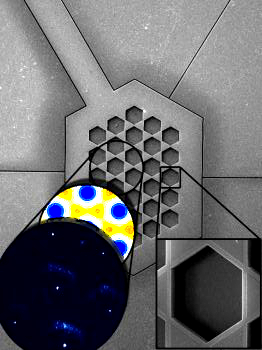Atom trapper helps quantum memory
 A powerful new microchip is under development in the UK, which is capable of holding the voltage equivalent to a micron-scale bolt of lightning.
A powerful new microchip is under development in the UK, which is capable of holding the voltage equivalent to a micron-scale bolt of lightning.
The device could be the key for developing next-generation, super-fast quantum computers, according to engineers at the University of Sussex.
Quantum computing holds exciting possibilities, but there are many challenges ahead before a complete system can use the basic motion of the universe to calculate problems.
One challenge for researchers has been in how to harness the ions (charged atoms) that can have the huge amount of memory required to build quantum technology devices. Creating microchips powerful enough to provide a backbone for such technologies has been a field of intense research
Now, in a study published in Nature Communications, researchers from the Sussex University Ion Quantum Technology Group have created a microchip design that can host a lattice of individually charged atoms, held by electric fields emitted from the surface of the microchip.
This is the first time that a two-dimensional chessboard lattice of individual ions has been trapped on a microchip.
In order to allow for a solid architecture and to hold individual atoms long enough for practical experiments, researchers had to engineer a microchip that can withstand very large voltages, in excess of 1000V.
The ability to create a chess-board lattice of individual atoms is particularly important in the quest to build a quantum simulation machine. Such a device could solve many open problems in science such as energy transport in materials, high-temperature superconductivity and the structure of complex biomolecules.
Lead researcher Dr Winfried Hensinger says it was wild time in the lab.
“We blew quite a few chips and created a lot of lightning to measure the voltage that can be applied,” he said.
“The results are very exciting. We now have a stable structure to build long term storage devices for single atoms. It’s also a big step in building a large-scale ion trap quantum simulator, a very powerful tool to understand many problems in science.
“While this new microchip may be a significant step in the development of quantum technology, this technology may also have applications in the manipulation and sorting of biological samples and chemicals, and other sensor technologies that rely on the storage of individual charged particles for long periods.”








 Print
Print